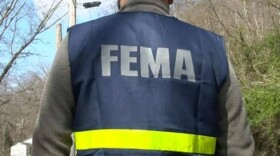AILSA CHANG, HOST:
The vast majority of people have not had to evacuate their homes during these wildfires. That's something you might not understand from watching all the media coverage - images of homes burning, people fleeing in distress. And now tens of thousands of people did have to evacuate, but there are about 10 million people living in the Los Angeles area. Katia Riddle covers mental health, and she's been reporting on these fires. And she's joining me now to talk about the many, many Angelinos who did not have to evacuate - including myself - and the very complicated emotional experience that we are going through right now. Hi, Katia.
KATIA RIDDLE, BYLINE: Hi, Ailsa.
CHANG: So I know that you've been here now for several days, reporting on these fires. What got you interested in this particular aspect of the story?
RIDDLE: It started for me when I flew in. I knew, of course, rationally, that the whole city was not on fire. But when I looked out over the landscape as I landed at LAX, it just looked so calm and peaceful, and it seemed so surreal to me to be contrasting the destructive images I'd seen with the sort of business-as-usual portion of the city that I saw from the airport.
CHANG: Right.
RIDDLE: That said, nearly everyone I've talked to here has either themselves been hit by tragedy or knows someone that has been hit by tragedy of varying degrees. It's sort of concentric circles of trauma, depending on how close you are to the Palisades or Altadena. Many people have said things like, I feel bad because my house is still standing, and my neighbor lost everything. There's a real sense of survivor's guilt among many people here.
CHANG: Exactly. It's this sick combination of guilt and relief and fear that I could be next - like, if not now, at some point. And you keep imagining, what would it be like to lose everything? How would I bear it? And then you're like, OK, stop. Stop, Ailsa. You're OK. Just stop. Do something useful. Stop looping. I mean, what do we do with all these feelings of helplessness and guilt right now? Because I'm fried, and I never even evacuated.
RIDDLE: I talked to a psychiatrist who is the director of emergency psychiatry at Cedars-Sinai Hospital. His name is Jace Reed. He explained that it's very important for people to honor their own experiences in these moments. Even if, for example, your house is still standing but your neighbor's is not, there's real grief in losing your neighborhood. And there's real grief for anyone in LA watching this happen to their city. And it's important to acknowledge feelings without comparing them. We are not in a suffering Olympics. It doesn't mean that we can't continue to support or help others who need it. But he stressed that, for people recovering from this kind of trauma, whether it's direct or secondary, part of the healing process is allowing yourself to do the things that you enjoy.
JACE REED: Some things that you can do is be OK to take time to feel happy, to find joy in little things. A lot of people, during these stressful times, feel like they have to be sad. They have to be worried about something. But it's OK to find that joy. Those are normal things to experience during this time.
CHANG: God, that is so helpful because it was my birthday this past weekend, and I did feel guilty for celebrating quietly with a few friends. You know, I felt like frivolous, kind of tone-deaf. And I also recognized how much I badly needed community and connection and how much I needed to laugh. And I imagine there are a lot of people out there who are feeling some version of this. Am I allowed to be happy when there's so much trauma and grief around us?
RIDDLE: Yes. In fact, Reed was emphatic about the need to really moderate news consumption and prioritize other things, like a birthday party.
REED: We feel like we need to consume more and more of the information, and a lot of it has very traumatic images - scary things for all of us. And we may find ourself caught in a cycle of just rewatching the same thing over and over, getting more and more worried.
RIDDLE: So if you find that images on TV or social media are getting you really upset, psychologists say you should note how these things are making you feel physically - you know, are your shoulders hunching? Is your heart racing? - and take a breath and a break from it.
CHANG: Yeah, cut yourself some slack. It's OK to take care of yourself so you can take care of other people later, right?
RIDDLE: Exactly.
CHANG: That is NPR's Katia Riddle. Thank you so much, Katia.
RIDDLE: Thank you, Ailsa. Transcript provided by NPR, Copyright NPR.
NPR transcripts are created on a rush deadline by an NPR contractor. This text may not be in its final form and may be updated or revised in the future. Accuracy and availability may vary. The authoritative record of NPR’s programming is the audio record.







